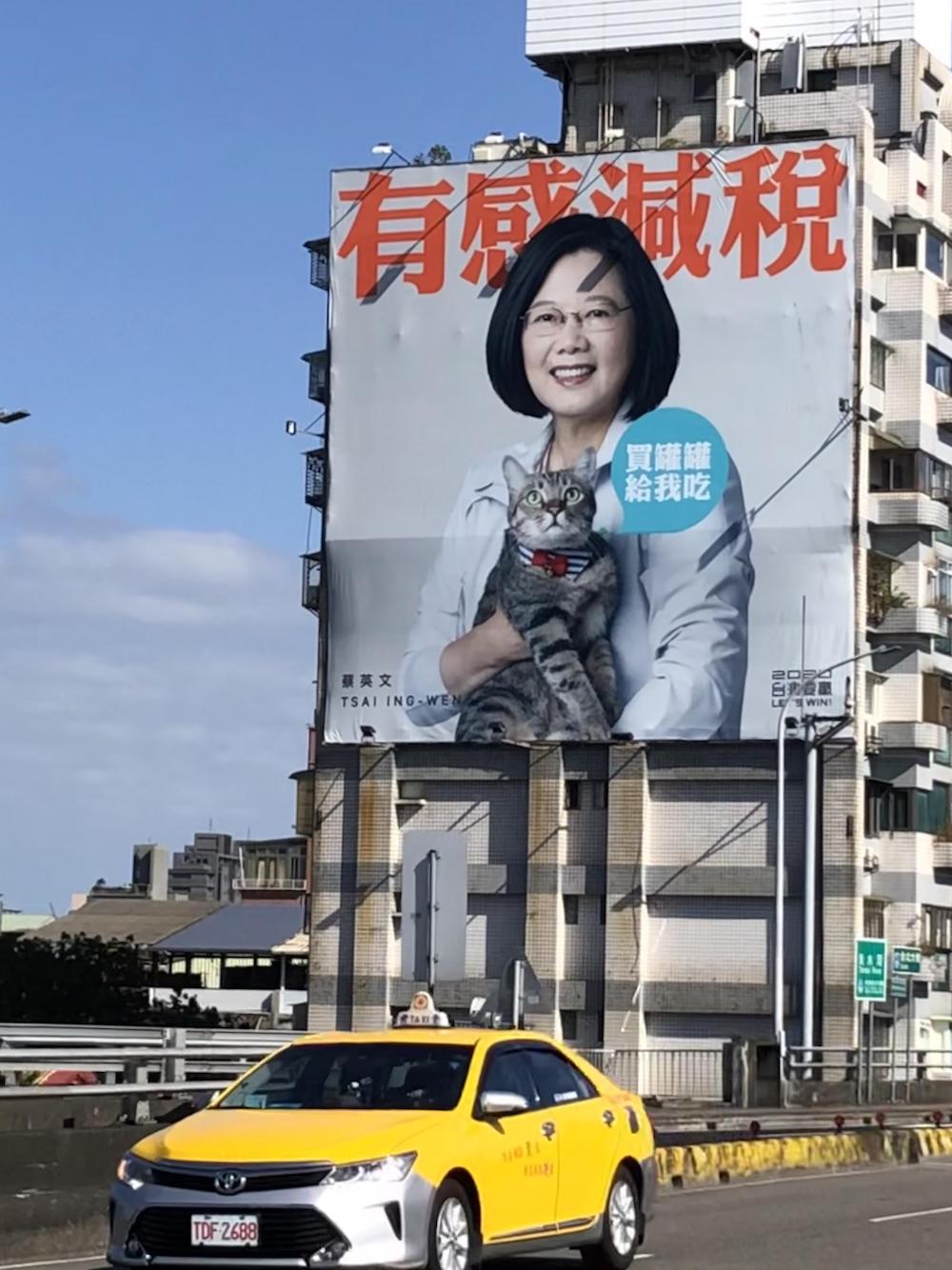Cat chat and tax talk
« previous post | next post »
Photograph of a campaign billboard in Taiwan showing President Tsai Ing-wen, who is up for reelection on January 11, with one of her two beloved cats:
The large red characters at the top of the billboard read:
Yǒu gǎn jiǎn shuì
有感減稅
"A tax cut you can feel"
The second half of the slogan cannot be misinterpreted: jiǎn shuì 減稅 ("reduce taxes"). It is widespread in virtually all democratic elections.
The first half, though, is not well known, so its meaning is not immediately obvious. Does it mean "sensible"? People not familiar with current Taiwanese political culture will probably not be able to readily and fully apprehend its implications.
The context is "Zhèngfǔ de zhèngcè bìxū ràng rénmín yǒu gǎn 政府的政策必须让人民有感" ("The policies of the government must be felt by the people"). In "Yǒu gǎn jiǎn shuì 有感减税", I think it means that the amount of the tax cut reaches to a certain degree that people can actually feel the difference. It's not a common term, but has become increasingly popular, such that it can now be used as a key part of a powerful campaign slogan.
Here are some amplifications and nuances from a political commentator:
Yǒu gǎn jiǎn shuì, shì bù dà kěnéng de. Bùguò, yīxiē xiǎoquèxìng jiǎn shuì, yīn yǐngxiǎng yǒuxiàn, háishì kěyǐ zuò de.
有感減稅,是不大可能的。不過,一些小確幸減稅,因影響有限,
"A tax cut that you can feel is not quite possible. However, some tax cut that is small, ensured, and fortunate, is still do-able due to the limitation of its impact."
N.B.: It's neat how xiǎoquèxìng 小確幸 (J. shōgakkō), a literary, semi-poetic neologism first used by Murakami Haruki in his Afternoon in the Islets of Langerhans ( Rangeruhansu tō no gogo ランゲルハンス岛の午后; 1986), is here modifying "tax cut". I'm more interested in what the cat is saying:
Mǎi guànguàn gěi wǒ chī
買罐罐給我吃
"Buy can-can [food] for me to eat"
This is baby talk. An adult (human being) would say:
Mǎi guàntóu gěi wǒ chī
買罐頭給我吃
"Buy can[ned] [food] for me to eat"
It's common for pet owners in Taiwan to use baby-style language to talk to their fur kids. In fact, the term "guànguàn 罐罐" ("can-can [food]") nowadays is only used to refer to canned pet food in Taiwan. It's not even used to refer to human baby food. This ad is obviously targeting pet owners, many of whom are young professionals and tend to be supporters of the Democratic Progressive Party (DPP), the Party to which President Tsai belongs.
The writing on the billboard seems simple and straightforward. It is actually subtle and sophisticated — brilliant campaign rhetoric.
Readings
- "Baby talk" (12/21/10)
- "Baby talk, part 2" (8/19/18)
- "The babbling phase: ranting toddler speaks out" (9/2/10)
- "Ask LL: parents' beliefs or infants' abilities?" (10/29/09)
- "Bèibèi panda" (9/26/15)
- "Babies Dismount" (1/15/19)
[Thanks to Mien-hwa Chiang, Grace Wu, Melvin Lee, and Diana Shuheng Zhang]

Wayne said,
December 12, 2019 @ 11:53 am
I think most Taiwanese would look at 有感 and pronounce it as "you few". It's sometimes written as FU, but the pronunciation is closer to "few" rather than "foo." I've definitely seen 最有FU written in ads and whatnot.
It's from broken Chinglish, like 太over, 他很有fashion, or delay一下.
Half-assed Googling turns up examples like this:
https://www.hopenglish.com/correctspeakingway
https://www.facebook.com/hijewelcalifornia/posts/415030365212980/
Victor Mair said,
December 12, 2019 @ 12:58 pm
From Jay Rubin:
Whoa, that's a stretch getting Murakami in there. Funny, though. Perhaps it's worth noting that the Chinese "literary, semi-poetic neologism" 小確幸 uses 幸 as an adjective where Murakami uses it as a noun ("a small [but] certain happiness"). His use of the three characters 小確幸 is a deliberately screwball abbreviation of the rather verbose 小さくはあるが確固とした幸せ, which refers to one small but certain happiness in the narrator's life, the neat filling of a dresser drawer with tightly rolled underpants.